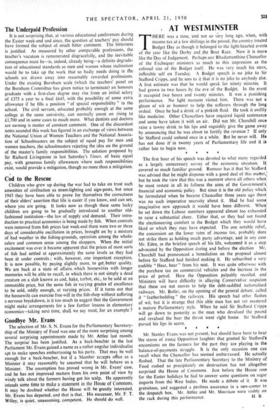The Underpaid Profession It is not surprising that, at various
educational conferences during the Easter week-end and since, the question of teachers' pay should have formed the subject of much bitter comment. The bitterness is justified. As measured by other comparable professions, the teacher's vocation is remunerated disgracefully, and the inevitable consequence must be—is, indeed, already being—a definite degrada- tion of educational standards as men and women whose inclination would be to take up the work that so badly needs doing in the schools are drawn away into reasonably rewarded professions. Under the existing Burnham scale (which the teachers' panel on the Burnham Committee has given notice to terminate) an honours graduate with a first-class degree may rise from an initial salary of £375 a year to a final £645, with the possibility of some extra allowance if he fills a position " of special responsibility " in the school. The civil servant, educated probably enough at the same college at the same university, can normally count on rising to £1,700 and in some cases to much more. What dentists and doctors are earning is matter of constant comment. One of the discordant notes sounded this week has figured in an exchange of views between the National Union of Women Teachers and the National Associa- tion of Schoolmasters on the subject of equal pay for men and women teachers, the schoolmasters rejecting the idea on the ground of the master's family responsibilities. The solution proposed by Sir Richard Livingstone in last Saturday's Times, of basic equal pay, with generous family allowances where such responsibilities exist, would provide a mitigation, though no more than a mitigation.






































 Previous page
Previous page